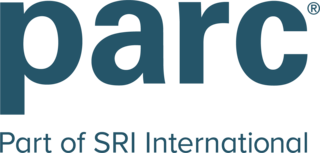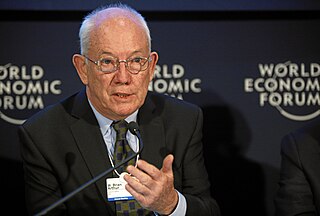Related Research Articles

Douglas "Doug" Carl Engelbart was an American engineer, inventor, and a pioneer in many aspects of computer science. He is best known for his work on founding the field of human–computer interaction, particularly while at his Augmentation Research Center Lab in SRI International, which resulted in creation of the computer mouse, and the development of hypertext, networked computers, and precursors to graphical user interfaces. These were demonstrated at The Mother of All Demos in 1968. Engelbart's law, the observation that the intrinsic rate of human performance is exponential, is named after him.

Ralph C. Merkle is an American computer scientist and mathematician. He is one of the inventors of public-key cryptography, the inventor of cryptographic hashing, and more recently a researcher and speaker on cryonics.

SRI Future Concepts Division is a research and development company in Palo Alto, California. It was founded in 1969 by Jacob E. "Jack" Goldman, chief scientist of Xerox Corporation, as a division of Xerox, tasked with creating computer technology-related products and hardware systems.

Xerox Holdings Corporation is an American corporation that sells print and digital document products and services in more than 160 countries. Xerox is headquartered in Norwalk, Connecticut, though it is incorporated in New York with its largest group of employees based around Rochester, New York, the area in which the company was founded. The company purchased Affiliated Computer Services for $6.4 billion in early 2010. As a large developed company, it is consistently placed in the list of Fortune 500 companies.

Johns Frederick (Jeff) Rulifson is an American computer scientist.

The Xerox Alto is a computer system developed at Xerox PARC in the 1970s. It is considered one of the first workstations or personal computers, and its development pioneered many aspects of modern computing. It features a graphical user interface (GUI), a mouse, Ethernet networking, and the ability to run multiple applications simultaneously. It is one of the first computers to use a WYSIWYG text editor and has a bit-mapped display. The Alto did not succeed commercially, but it had a significant influence on the development of future computer systems.

John Leroy Hennessy is an American computer scientist who is chairman of Alphabet Inc. (Google). Hennessy is one of the founders of MIPS Technologies and Atheros, and also the tenth President of Stanford University. Hennessy announced that he would step down in the summer of 2016. He was succeeded as president by Marc Tessier-Lavigne. Marc Andreessen called him "the godfather of Silicon Valley."

SRI International (SRI) is a nonprofit scientific research institute and organization headquartered in Menlo Park, California, United States. It was established in 1946 by trustees of Stanford University to serve as a center of innovation to support economic development in the region.

SRI International's Augmentation Research Center (ARC) was founded in the 1960s by electrical engineer Douglas Engelbart to develop and experiment with new tools and techniques for collaboration and information processing.
Interval Research Corporation was founded in 1992 by Paul Allen and David Liddle. It was a Palo Alto laboratory and technology incubator focusing on consumer product applications and services with a focus on the Internet.
Richard Earl Fikes is a computer scientist and Professor (Research) Emeritus in the Computer Science department of Stanford University. He is professionally active as a consultant and expert witness. He led Stanford's Knowledge Systems Laboratory from 1991 to 2006, and has held appointments at Berkeley, Carnegie-Mellon, Price Waterhouse Technology Centre, Xerox PARC, and SRI International.

John Seely Brown, also known as "JSB", is an American researcher who specializes in organizational studies with a particular bend towards the organizational implications of computer-supported activities. Brown was director of Xerox PARC from 1990 to 2000 and chief scientist at Xerox from 1992 to 2002; during this time the company played a leading role in the development of numerous influential computer technologies. Brown is the co-author of The Social Life of Information, a 2000 book which analyzes the adoption of information technologies.
Dana Randall is an American computer scientist. She works as the ADVANCE Professor of Computing, and adjunct professor of mathematics at the Georgia Institute of Technology. She is also an External Professor of the Santa Fe Institute. Previously she was executive director of the Georgia Tech Institute of Data Engineering and Science (IDEaS) that she co-founded, and director of the Algorithms and Randomness Center. Her research include combinatorics, computational aspects of statistical mechanics, Monte Carlo stimulation of Markov chains, and randomized algorithms.
Samuel Henry Armacost is an American business executive who was formerly the president, director, and CEO of BankAmerica Corporation. He has chaired or served on the boards of directors of major organizations such as SRI International and Chevron Corporation.

William Brian Arthur is a Belfast-born economist credited with developing the modern approach to increasing returns. He has lived and worked in Northern California for many years. He is an authority on economics in relation to complexity theory, technology and financial markets. He has been on the external faculty at the Santa Fe Institute, and a Visiting Researcher at the Intelligent Systems Lab at PARC. He is credited with the invention of the El Farol Bar problem.
Stanford University has many centers and institutes dedicated to the study of various specific topics. These centers and institutes may be within a department, within a school but across departments, an independent laboratory, institute or center reporting directly to the dean of research and outside any school, or semi-independent of the university itself.

Nagabhushan "Rao Machiraju" is an Indian American scientist and business executive, and holds 10 patents in information retrieval.
Marcus William Feldman is the Burnet C. and Mildred Finley Wohlford Professor of Biological Sciences, director of the Morrison Institute for Population and Resource Studies, and co-director of the Center for Computational, Evolutionary and Human Genomics (CEHG) at Stanford University. He is an Australian-born mathematician turned American theoretical biologist, best known for his mathematical evolutionary theory and computational studies in evolutionary biology, and for originating with L. L. Cavalli-Sforza the theory of cultural evolution.
References
- ↑ "Engineering Advisory Council Bio". www.ece.umich.edu. Archived from the original on 7 May 2021. Retrieved 9 September 2020.
- ↑ "Bringing Design to Software Ch. 2 - Liddle". hci.stanford.edu. Retrieved 9 September 2020.
- ↑ SFI Bulletin (PDF), vol. 14, Santa Fe Institute, Fall 1999, p. 27, archived from the original (PDF) on 2009-11-28, retrieved 2009-02-27
- ↑ "Archived copy" (PDF). Archived from the original (PDF) on 2017-01-16. Retrieved 2017-01-14.
{{cite web}}: CS1 maint: archived copy as title (link) - ↑ "David Liddle Joins SRI International Board of Directors". SRI International. 2012-01-04. Archived from the original on 2016-03-06. Retrieved 2013-06-13.